After Saturday’s
dramatic qualifying action in Group C, Scotland have the chance to
reach their first World Cup
since 1998. They need to beat group leaders Denmark at Hampden Park
on Tuesday night to usurp the Danes and steal top
spot.
Heading into the November international break a year ago, the
Scottish men’s international team were in a difficult position.
Sixteen international matches across 13 months had seen them win
just once, and even that victory came against European minnows
Gibraltar in a friendly.
After reaching Euro 2024 – mostly thanks to a five-game winning
run at the start of the qualification cycle, including victories
over Spain and Norway – Scotland bowed out of the tournament with
barely a whimper. With just one point from three games and a goal
difference of -5, the Scots were, statistically at least, the worst
team at Euro 2024.
In truth, their form ahead of the tournament should have
indicated how their performances in Germany last summer would go. A
4-0 defeat in the Netherlands was followed days later by a 1-0 home
loss to Northern Ireland, and a lacklustre 2-2 draw with Finland on
the eve of the finals came after that two-goal win against
203rd-ranked Gibraltar
The Euro 2024 hangover produced three defeats and a draw across
September and October 2024 in the UEFA Nations League, but that
draw – a gutsy 0-0 at home to Portugal – saw them avoid becoming
the first Scottish men’s team to lose five straight games.
Since then, things have looked much brighter for Steve Clarke’s
side. Including that draw against Portugal, Scotland have lost just
two of their last 10 competitive matches, winning seven. The only
two defeats in that run have come against Greece – firstly in the
UEFA Nations League back in March, and also in their 3-2 loss in
Piraeus on Saturday night.
That latest defeat could have easily condemned Scotland to the
World Cup 2026 play-offs, but they were given an unlikely lifeline
by Belarus. On zero points after four games before their trip to
Denmark on Saturday, Belarus drew 2-2 in Copenhagen, leaving the
Danes just a point ahead of Scotland before their trip to Glasgow’s
Hampden Park on Tuesday.
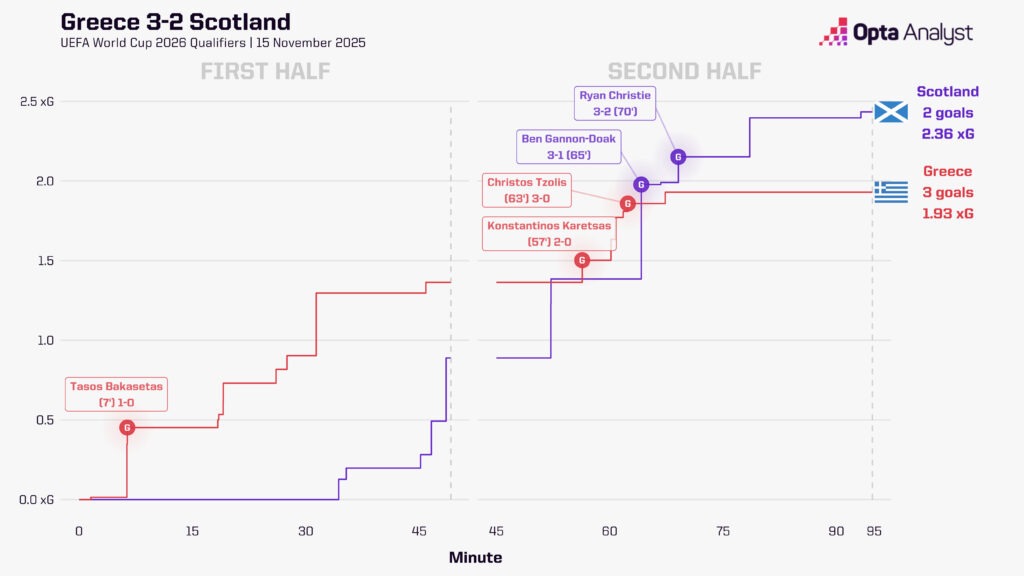
That means the final group game for both sides is essentially
now a World Cup 2026 play-off in itself. If Scotland win, they head
to the World Cup as Group C winners. If Denmark earn at least a
point, it will be them automatically qualifying as the top-ranked
team in the group.
Crunch
Time in Group C
Clarke has taken charge of 73 games, the most of any standalone
Scotland manager, but this could be his biggest match so far. Not
since 1998 have Scotland played at a men’s World Cup tournament,
having failed to qualify for each of the six editions since. Now
Clarke has the chance to become the first coach to take them there
since Craig Brown 27 years ago.
Securing a win over Denmark will be far from easy. Currently
ranked 20th in the latest edition of the FIFA Rankings, they are
the 11th best-ranked European team in men’s football. Scotland have
won just one of their last 10 international games against teams
ranked inside the top 20 (L7 D2) but did win their last game
against Croatia a year ago at Hampden Park.
The good news is that it has been done before. The last time
Scotland won a World Cup qualifier against a nation inside the top
20 of the FIFA Rankings (on the day of the fixture) was at home
against Denmark in November 2021, winning 2-0 courtesy of goals
from John Souttar and Ché Adams.
Home advantage could be key here, too. Clarke’s side have won 10
of their last 14 home World Cup qualifiers (D3 L1), including
winning six of their last seven in Scotland.
Even the most ardent Scotland fan will agree that Denmark are
the strongest team in the group, and the statistics confirm that.
They are the highest scoring side in Group C (14 goals) and have
generated the best quality chances (12.0 xG), while defensively
they have conceded the fewest goals (3) and allowed opponents the
fewest shots (42).
Saturday’s 2-2 draw with Belarus skews some of their attacking
numbers, though. They had 35 shots in that game, their most on
record in a competitive international fixture (since 2006), and 11
of them came in the final 10 minutes of the game.
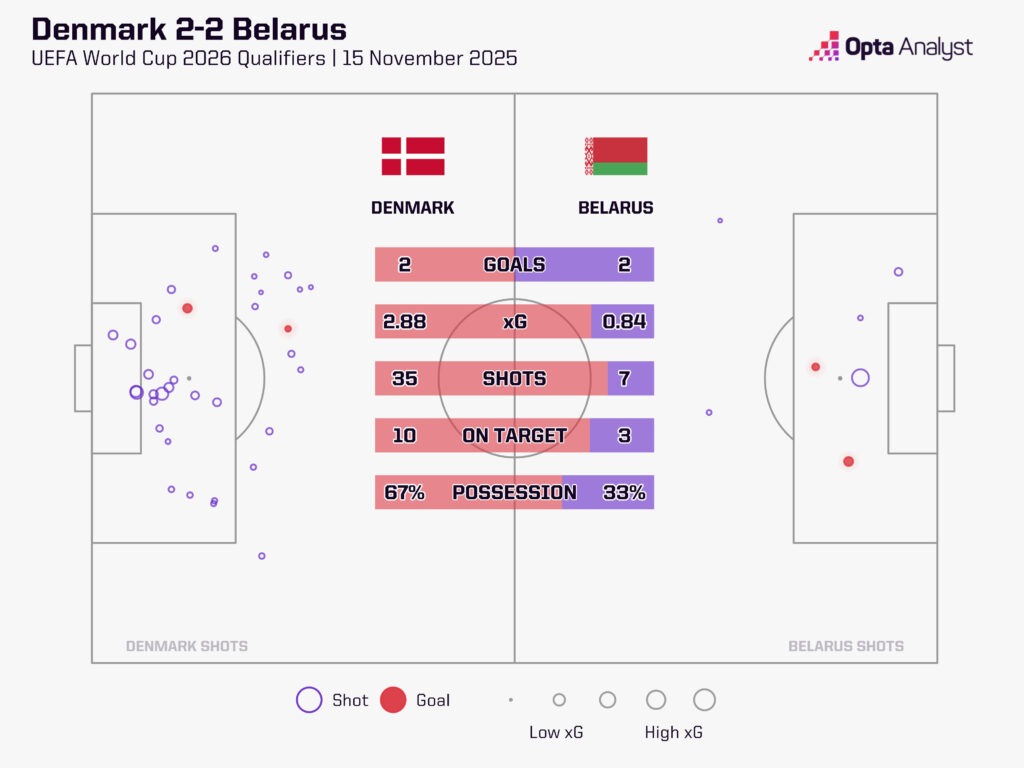
Serie A
Duo Key to Potential Scottish Success
Central midfielders Scott
McTominay and Lewis
Ferguson have become increasingly important to Clarke and
Scotland’s chances of qualifying for the World Cup.
The rise of McTominay is no secret – his move to Napoli has
turned him into one of the best advanced midfielders in Europe,
with the Scotsman enjoying Serie A title success in 2024-25,
helping him win the league’s most valuable player award at the end
of the campaign.
Since the start of 2023, McTominay has provided 14 goal
involvements in 29 caps for Scotland (12 goals, 2 assists) – five
more than any other player. His 12 goals are double that of the
next highest scorer for Scotland in his period, Ché Adams’ tally of
six. Had it not been for Odysseas Vlachodimos’ sensational save on
Saturday with 11 minutes remaining, McTominay would have added
another goal and salvaged an incredible comeback from 3-0 down.
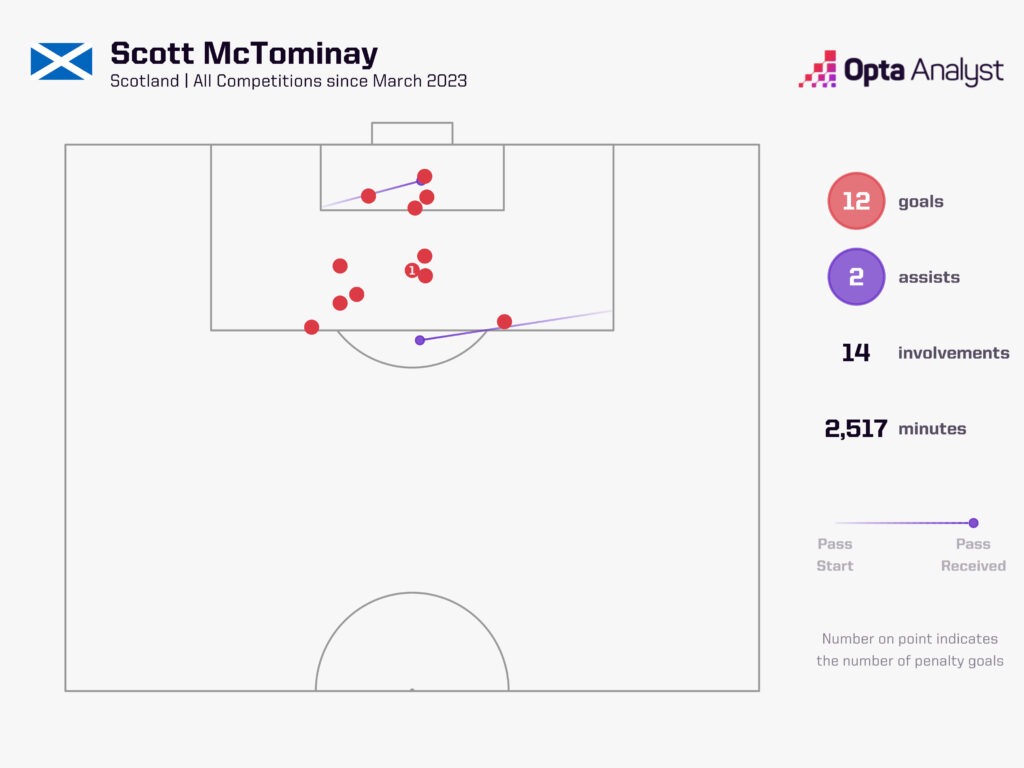
Ferguson made his debut under Clarke four years ago but missed
out on a spot in the Scottish Euro 2024 squad through injury.
Another Scottish player impressing in the Italian top flight, the
26-year-old is now in his fourth season at Bologna since moving
from Aberdeen in 2022.
While McTominay plays off the Scotland strikers, Ferguson makes
more impact from deep-lying positions and is very much a
tempo-setter in midfield. Comfortable in possession, Ferguson has
completed 88% of his passes during this qualification campaign, and
11 of his 14 involvements in Scotland’s open-play shots have seen
his only role come in the build-up rather than taking the shot (1)
or creating it (2).
Despite Ben
Gannon-Doak (20 years and 4 days old) becoming Scotland’s
youngest goalscorer in 15 years during Saturday’s defeat, there is
a feeling that time is running out for a lot of Clarke’s current
squad. His starting XI on Saturday in Greece had an average age of
29 years and 280 days – their oldest in a World Cup qualifier on
record (since 2004).
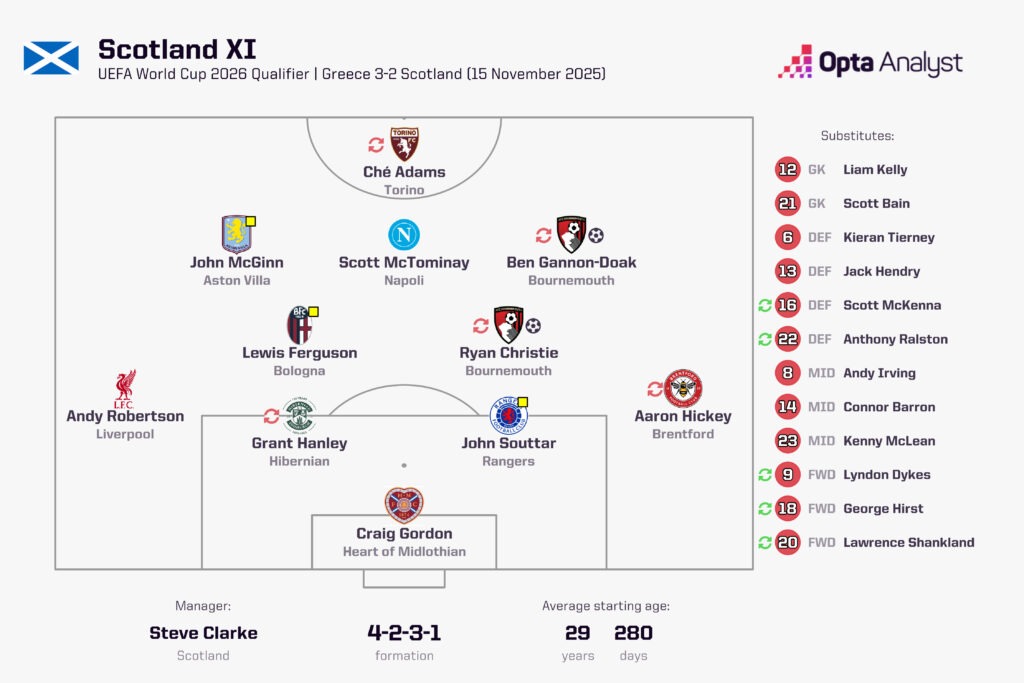
Of course, that average age is skewed by having 42-year-old
Craig Gordon in goal, but only two of the starters were under 26
years old – Gannon-Doak and Aaron Hickey. Captain Andy
Robertson will be 32 by the time the 2026 World Cup comes
around, and the influential John
McGinn turned 31 last month – they were two of the six players
aged 30+ to appear in Saturday’s defeat.
It is the experienced duo of McGinn (68 games) and Robertson
(60) that have played most often under Clarke during his reign,
with the Scotland manager needing his more experienced players to
hold their nerve on Tuesday night.
There are hopes around players like Kieron Bowie, Tommy Conway,
James Wilson, Max Johnston and Lennon Miller for the future, but
that quintet are still untested at international level, having
played just 479 minutes combined.
Scotland
vs Denmark Prediction
Despite home advantage on Tuesday night, the Opta
supercomputer isn’t big on Scotland’s hopes of qualifying
automatically for the 2026 World Cup.
Across 10,000 pre-game simulations, Scotland won just 30.2% of
the time, with Denmark doing enough to secure top spot in Group C
in the rest of the sims, winning 44.9% of the time and securing a
draw in the other 24.9%.
Of course, defeat doesn’t spell the end for either side. Whoever
is unsuccessful in this match will have another chance in the UEFA
confederation play-offs to be played in March 2026.
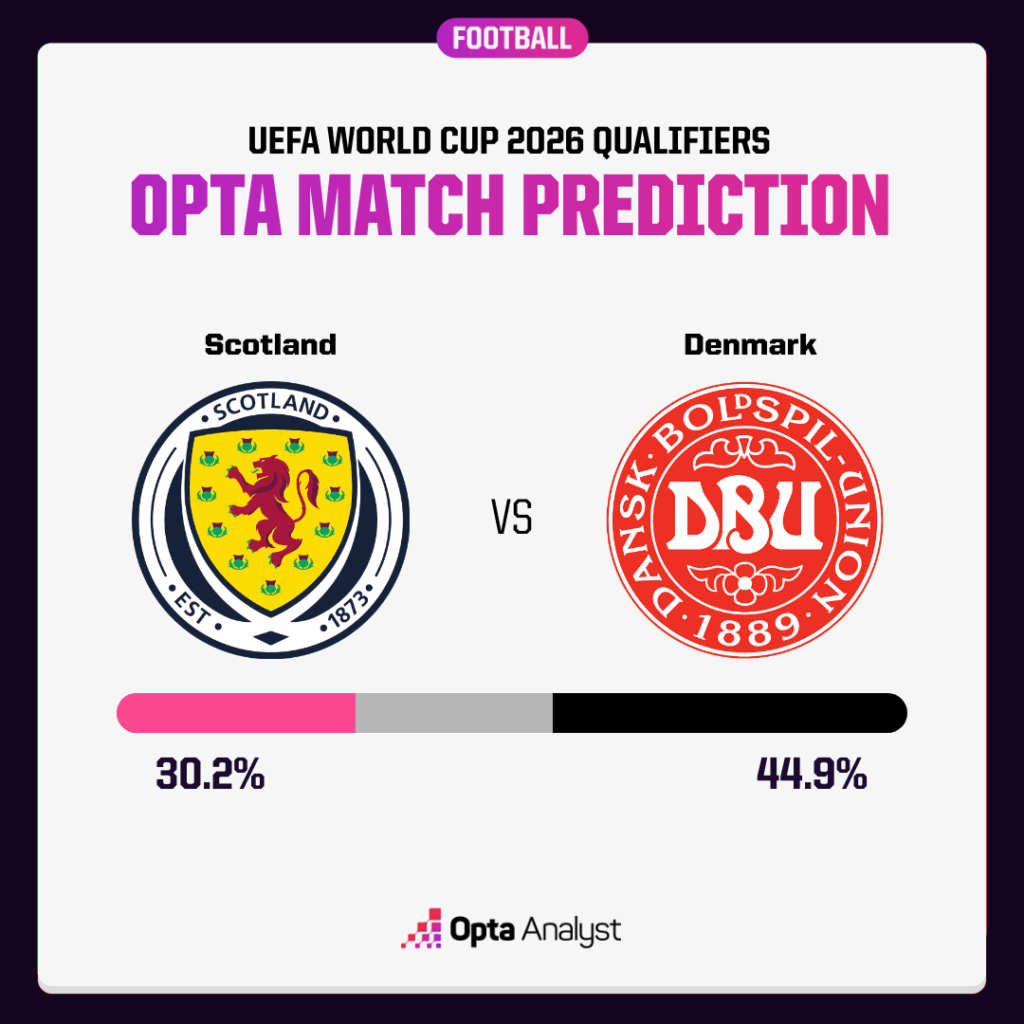
Enjoy this? Subscribe
to our football
newsletter to receive exclusive weekly content. You can
also follow our social accounts over on X, Instagram, TikTok and Facebook.
